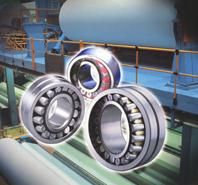NSK’s New Bearing Designs Deliver Longer Life, Higher Speeds in Papermaking Machines
Rolling bearings used in the production of paper undergo a continuous production cycle, are required to handle high-temperature conditions, increasing loads and higher speeds; yet at the same time provide longer service life with the minimum of maintenance. The increasing demands worldwide for paper mean that failures in the continuous production cycle can be costly. Despite the many operating difficulties, bearing manufacturers are under pressure to provide increasing levels of reliability and operating life from their products. One of the major problems addressed by NSK is the trend to higher operating temperatures in the dryer sections of papermaking machines. These temperatures, up to 200$B!(BC on newer machines, cause high thermal stresses, which can lead to fracture of the inner rings of the spherical roller bearings used in the dryer sections. The same problem can also occur as a result of rapid dryer warm-up. The excessive thermal stresses that result can lead to broken bearings and breaks in production. The company analysed the mechanism of inner ring fracture, and established a strength evaluation method that enabled development of the TL (Tough and Long-Life) specification. The TL specification is a special surface treatment of an original steel type. According to the companys press release, it attains both high raceway surface hardness and dimensional stability under high temperatures (up to 2000C) while, simultaneously having the same level of compressive residual stress at the raceway surface as conventional carburised steel. The latter feature increases the fracture resistance performance commonly associated with conventional spherical roller bearings. In fact, TL specification bearings have higher inner ring fracture resistance compared with bainite steel (austempered high-carbon chrome bearing steel) and bearing steel (hardened high-carbon chrome bearing steel) units. The raceway surface hardness of the TL material also exceeds that of bainite bearing steel and carburised steel. This means that TL specification steel achieves a longer life, when foreign debris is present, than any of the other bearing steels. In addition to their use in dryer sections, TL Series spherical roller bearings are suitable for use in drying cylinders, PV, canvas, paper and breaker stack bottom rolls, soft calendars, and Yankee dryers. NSK also developed the HPSTM series of spherical roller bearings for use in other small diameter rolls in the papermaking process, including canvas rolls, paper rolls, felt rolls and rider. The HPS series is a new design of spherical roller bearing (SRB) that offers twice the running life of conventional SRB of the same size, together with a 20% increase in running speed. To address the cage wear issue, the company developed a special nitriding surface treatment, which is applied to the high-precision pressed steel cage of the HPS series bearings. Compared to conventional nitriding, NSKs treatment forms a finer and harder surface with a more uniform hardness. Finally, NSKs Molded Oil bearings (standard deep groove ball and SRB) enable machine users to replace existing methods of lubricating machine parts, especially on raw material conveyors, carrier rope sheaves and suction rolls. "Molded Oil" is a plastic containing lubricating oil and the lubricating oil accounts for more than 50% of the content. Therefore, the mechanism of oil discharge from the matrix is temperature-dependent--the higher the heat generation, the higher the oil discharge rate. Bearings equipped with Molded Oil are particularly suited to environments exposed to moisture or paper dust. They do not suffer from oil leakage and there is no loss of lubricant due to the ingress of water. In addition, Molded Oil bearings can affect equipment performance in environments where lubrication is difficult to apply and in places where oil and grease absorbing dust is produced. In both cases, long-term bearing performance is increased.




